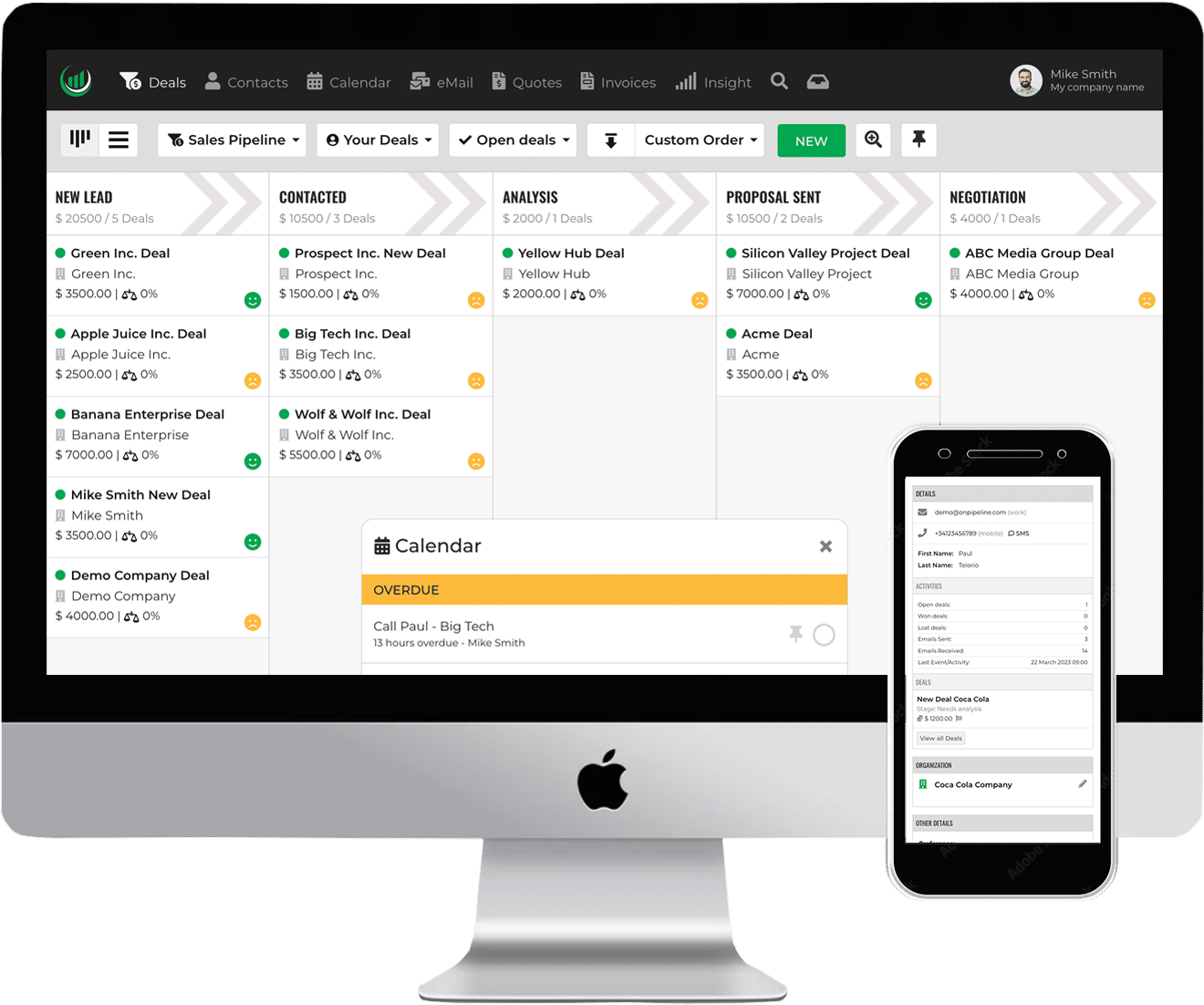The CSO’s primary objective is to drive revenue growth by developing and implementing effective sales strategies, overseeing sales operations, and ensuring the sales team meets its goals.
With a focus on optimizing sales processes and maximizing revenue generation, the CSO leverages tools such as Customer Relationship Management (CRM) to manage customer interactions, analyze sales data, and identify opportunities for growth.
Key Responsibilities
1. Strategic Planning and Execution
- Develop and Implement Sales Strategies: Use market research, industry insights, and customer feedback to devise comprehensive sales strategies tailored to the company’s objectives and market. This involves identifying key growth opportunities, and outlining specific tactics.
- Sales Target: Collaborate with executive leadership to establish achievable sales targets that align with the company’s overall plans. Break down targets into annual, quarterly, and monthly goals, ensuring they are realistic and measurable, and adjust as necessary based on market dynamics and performance trends.
2. Leadership and Management
- Team Leadership and Motivation: Lead by example, setting a high standard of professionalism, integrity, and performance for the sales team to emulate. Foster a culture of improvement and accountability, where team members feel empowered to take ownership of their roles and contribute to success.
- Talent Development: Invest in recruiting sales talent with diverse backgrounds, ensuring a well-rounded team capable of addressing various market challenges. Provide ongoing sales training and mentorship programs.
- Cultural Development: Cultivate a positive and collaborative sales culture characterized by open communication, mutual respect, and a shared commitment. Celebrate successes, acknowledge achievements, and foster a sense of teamwork among sales team members.
3. Sales Operations
- Process Optimization: Evaluate sales processes and methodologies to streamline workflows, eliminate inefficiencies, and maximize productivity. Leverage data analytics and performance metrics to identify bottlenecks, pain points, and areas for improvement, implementing solutions to enhance operational effectiveness.
- Performance Monitoring: Implement systems for tracking and monitoring sales performance metrics in real-time, providing visibility into key indicators such as sales pipeline, conversion rates, and revenue growth. Regularly analyze performance data to identify trends, patterns, and opportunities for optimization, informing strategic decision-making and resource allocation.
- Technology Management: Leverage cutting-edge sales tools and technologies to automate repetitive tasks, streamline administrative processes, and empower sales representatives to focus on high-value activities such as prospecting, relationship-building, and closing deals. Ensure that sales tools are integrated seamlessly with other business systems, facilitating data sharing and collaboration across departments.
4. Customer Relationship Management
- Stakeholder Engagement: Develop strong relationships with key customers, partners, and stakeholders, serving as a trusted advisor and strategic partner. Actively engage with customers to understand their unique needs, challenges, and goals, and proactively identify opportunities.
- Customer-Centric Approach: Embed a customer-centric philosophy into the sales organization, prioritizing the delivery of exceptional customer experiences at every touchpoint. Empower sales representatives to anticipate customer needs, address concerns proactively, and exceed expectations.
- Issue Resolution: Implement processes for capturing and addressing customer feedback, complaints, and escalations in a timely and effective manner. Act as a liaison between customers and internal stakeholders, facilitating resolution of issues and ensuring that customers feel heard, valued, and supported.
5. Collaboration and Communication
- Cross-Functional Collaboration: Alignment between sales and other functional areas such as marketing, product development, finance, and customer success. Facilitate regular communication and knowledge sharing across departments, ensuring that sales strategies are integrated with business objectives.
- Executive Communication: Provide updates and reports to executive leadership on sales performance, key initiatives, and market trends. Present findings, insights, and recommendations, enabling informed decision-making and strategic planning at the highest levels of the organization.
- External Representation: Serve as a brand ambassador and spokesperson for the company at industry events, conferences, and networking forums. Build relationships with key partners, influencers, and thought leaders in the industry, positioning the company as a trusted authority and partner of choice.
Key Skills
1. Strategic Thinking
- Visionary Leadership: Ability to create a clear and compelling vision for the future and align the sales strategy with the overall business objectives.
- Market Insight: Deep understanding of market dynamics, customer behavior, and competitive landscape to anticipate trends and identify opportunities.
- Long-Term Planning: Expertise in developing long-term plans that balance immediate needs with future growth objectives.
2. Leadership
- Team Building: Ability to attract, hire, and retain top sales talent, fostering a collaborative and high-performing team environment.
- Mentoring and Coaching: Providing guidance, feedback, and professional development opportunities to help team members grow and excel in their roles.
- Inspiring Confidence: Demonstrating integrity, credibility, and a positive attitude that motivates the team to achieve their best.
3. Analytical Skills
- Data-Driven Decision Making: Proficiency in using data and analytics to make informed decisions and drive sales strategies.
- Performance Metrics: Ability to set, monitor, and analyze key performance indicators (KPIs) to measure sales effectiveness and identify areas for improvement.
- Problem-Solving: Strong analytical thinking skills to quickly identify issues, propose solutions, and implement corrective actions.
4. Communication
- Clarity and Persuasion: Exceptional ability to communicate complex ideas clearly and persuasively to different stakeholders, including the sales team, executives, and clients.
- Active Listening: Listening carefully to understand the needs and concerns of team members and customers, ensuring effective and empathetic communication.
- Presentation Skills: Proficiency in preparing and delivering compelling sales presentations that inspire action and convey key messages effectively.
5. Customer Focus
- Customer-Centric Approach: Deep commitment to understanding and meeting the needs of customers, fostering long-term relationships and loyalty.
- Value Proposition: Ability to articulate and demonstrate the unique value proposition of the company’s products or services to customers.
- Customer Satisfaction: Proactively addressing customer feedback and concerns to ensure a positive customer experience and maintain high satisfaction levels.
6. Negotiation Skills
- Deal Structuring: Expertise in structuring and negotiating complex deals and contracts that maximize value for both the company and the customer.
- Conflict Resolution: Skilled in resolving conflicts and finding win-win solutions that satisfy all parties involved.
- Influence and Persuasion: Ability to influence and persuade stakeholders to achieve favorable outcomes in negotiations.
7. Adaptability
- Flexibility: Ability to adapt to changing market conditions, business priorities, and customer needs with agility and resilience.
- Innovation: Encouraging and embracing innovative approaches and technologies to stay ahead in a competitive market.
- Continuous Improvement: Commitment to continuous learning and improvement, staying current with industry trends and best practices.
8. Technology Savvy
- CRM software: Proficiency in using customer relationship management (CRM) software to manage customer interactions, sales pipelines, and performance data.
- Sales Tools: Familiarity with various sales tools and technologies that enhance productivity and effectiveness, such as sales automation platforms, analytics tools, and communication software.
CSO Salary
The salary of a Chief Sales Officer (CSO) can vary significantly based on geographic location, company size, industry, and experience.
Cost of living and local economic conditions significantly influence salary levels. In regions with a high cost of living (e.g., major cities in the US, Japan, and Northern Europe), salaries are typically higher to offset living expenses.
Below is a breakdown of average CSO salaries in different regions.
United States
- Average Base Salary: $200,000 – $300,000 per year
- Bonuses and Incentives: $50,000 – $150,000 per year
- Total Compensation: $250,000 – $450,000 per year
Additional Benefits: Health insurance, retirement plans, stock options, and other executive perks.
Japan
- Average Base Salary: $150,000 – $250,000 per year
- Bonuses and Incentives: $30,000 – $100,000 per year
- Total Compensation: $180,000 – $350,000 per year
China
- Average Base Salary: $120,000 – $200,000 per year
- Bonuses and Incentives: $20,000 – $80,000 per year
- Total Compensation: $140,000 – $280,000 per year
India
- Average Base Salary: $80,000 – $150,000 per year
- Bonuses and Incentives: $10,000 – $50,000 per year
- Total Compensation: $90,000 – $200,000 per year
Northern Europe
(e.g., UK, Germany, Scandinavia)
- Average Base Salary: $180,000 – $280,000 per year
- Bonuses and Incentives: $40,000 – $120,000 per year
- Total Compensation: $220,000 – $400,000 per year
Southern Europe
(e.g., Italy, Spain, Greece)
- Average Base Salary: $120,000 – $200,000 per year
- Bonuses and Incentives: $20,000 – $80,000 per year
- Total Compensation: $140,000 – $280,000 per year
Salaries tend to be higher in larger companies and in industries such as technology, finance, and pharmaceuticals. Startups and small to mid-sized enterprises may offer lower base salaries but compensate with equity or stock options.
CSOs with extensive experience, a proven track record of driving revenue growth, and strong industry connections command higher salaries.
Chief Sales Officer vs. Sales Manager
Both roles involve sales leadership and management, but the Chief Sales Officer (CSO) operates at a higher strategic level, overseeing the entire sales function and driving revenue growth at the organizational level.
On the other hand, a Sales Manager focuses on managing a specific sales team or territory, implementing sales strategies, and achieving sales targets within their area of responsibility. The CSO sets the strategic direction for sales, while the Sales Manager executes that strategy at the operational level.
Chief Sales Officer vs. Chief Revenue Officer
The Chief Sales Officer (CSO) primarily focuses on driving revenue through direct sales activities, managing the sales team, and developing sales strategies. Their key responsibilities include setting and achieving sales targets, leading and mentoring the sales team, optimizing sales processes, managing customer relationships and key accounts, and analyzing sales performance and market trends.
In contrast, the Chief Revenue Officer (CRO) has an overarching responsibility for all revenue-generating activities, which may encompass sales, marketing, customer success, and product pricing. The CRO’s key responsibilities involve aligning sales, marketing, and customer success strategies to maximize revenue, setting overall revenue targets and strategic goals, analyzing and optimizing the entire revenue generation process, and collaborating with other executives to ensure cohesive revenue growth.
Determining which position is higher in level between a Chief Sales Officer (CSO) and a Chief Revenue Officer (CRO) can vary depending on the organization’s structure and priorities. Traditionally, the Chief Revenue Officer (CRO) is considered higher in level due to their broader scope of responsibilities, overseeing not only sales but also marketing, customer success, and sometimes product pricing.
When do I need a CSO for my company?
You should consider hiring a Chief Sales Officer (CSO) for your company if you’re experiencing rapid growth, struggling to meet sales targets, entering new markets or customer segments, aiming to refine sales strategies, optimize sales technology, enhance customer relationships, or align sales with overall business strategy. A CSO provides strategic leadership to scale sales operations effectively, improve performance, drive revenue growth, and ensure alignment with broader business goals


